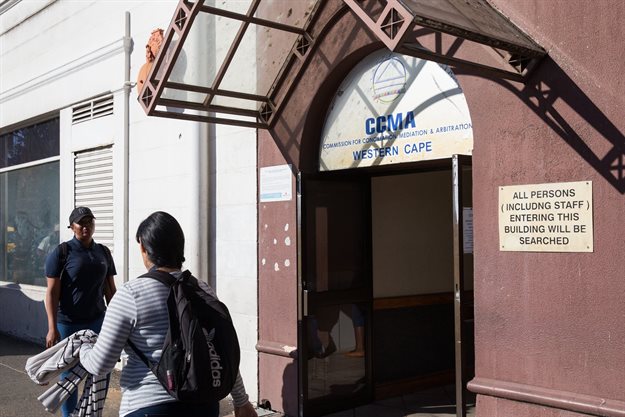Far fewer commissioners to listen to cases will mean reduced turnaround time.

The CCMA is no longer using its more than 500 part-time commissioners. Archive photo: Ashraf Hendricks
- The CCMA budget is being massively slashed.
- It has therefore stopped using its 565 part-time commissioners, leaving the caseload entirely to the 173 full-time commissioners.
- Unions have warned that this will hurt workers who will now have to wait longer for cases to resolve or be pushed into settling quickly for less.
Workers are going to suffer the most from the overwhelming caseloads at the Commission for Conciliation, Mediation and Arbitration (CCMA) over the next few years, especially now that part-time commissioners are no longer resolving disputes.
“When a worker is up against an employer representative, and you have a commissioner who tries to settle the matter as quickly as possible, in general the worker is going to be settling lower than what they should be settling for,” said Lynford Dor, spokesperson of The Casual Workers Advice Office (CWAO). He said the CWAO has seen some cases in the past where workers felt pressured during the conciliation process to settle the matter speedily.
Since 1 December 2020, the CCMA has stopped the use of part-time commissioners and has only been functioning with full-time commissioners. This comes after an article by BusinessLive in November last year which first raised the alarm about a R617 million budget cut at the CCMA.
The CCMA received a total of R978 million from the government during the 2019/20 financial year, and a total of R965 million in 2018/19, according to its latest annual report.
According to the institution’s latest annual performance plan for the 2020/21 financial year, at that time there were 173 full-time commissioners and an estimated 565 part-time commissioners resolving disputes at the CCMA.
In response to questions from GroundUp, CCMA director, Cameron Morajane, said that despite the budget reductions the CCMA continues to operate, and that operations have been able to continue using only full-time commissioners.
Morajane said that the impact of the budget cuts will be that it might now take longer to finalise arbitration cases.
He said that at 31 December 2020, the average period taken to finalise arbitrations was 70 days against a target of 75 days, compared to an average of 63 days to finalise arbitrations in 2019.
But Dor from the CWAO said that the effects of laying off the commissioners won’t be seen immediately. “We will see it over the next year when workers have to wait to have their cases heard. It will be clear in six months to a year how serious that decision was,” he said.
He also said that with the lack of commissioners resolving disputes, there will be greater pressure on the remaining commissioners to resolve disputes quickly, because of the overwhelming caseload. He said that there is the possibility that workers are “forced to sign the settlement agreements” due to a rushed conciliation process.
“And in many cases, workers sign away their rights in settlement agreements,” said Dor.
Dale Fish, general secretary of the Independent Commercial Hospitality and Allied Workers Union (ICHAWU), is also concerned by the increasing backlog of CCMA cases. “It’s a disaster. Employers are going to take advantage of it, knowing that if they dismiss employees, it’s only going to be heard at the CCMA in a year’s time,” said Fish.
Fish said that a consequence of the issues at the CCMA will result in a lot of strikes going forward, since there is no more urgency to resolve wage disputes.
The CCMA told GroundUp that it has “reviewed its operations, and have placed certain activities (such as conferences, training, recruitment) on hold in order to direct the available funds to the critical activities. The review of operations is a continuous process to ensure that the organisation is financially viable.”
This article was originally published by GroundUp.












































